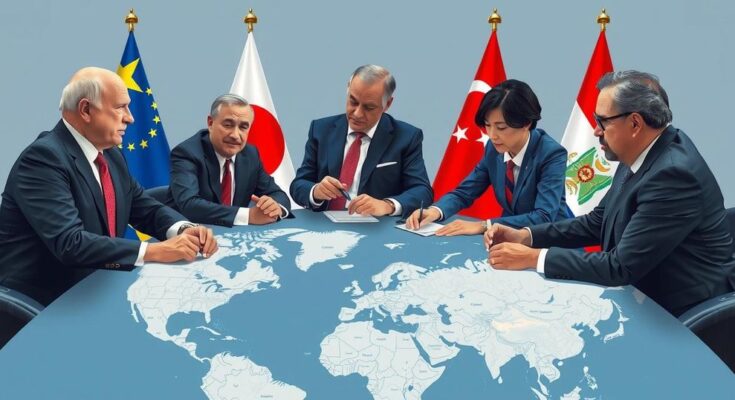Ahead of Donald Trump’s possible return to the White House, President Joe Biden has approved a national security memorandum designed to guide the next administration in countering the growing cooperation among China, Iran, North Korea, and Russia. The classified document includes strategic recommendations for interagency cooperation, intelligence sharing, and crisis management, reflecting the complexities of current international relations impacted by the fallout from Russia’s invasion of Ukraine.
In anticipation of Donald Trump’s potential return to the presidency, President Joe Biden has sanctioned a national security memorandum that serves as a strategic framework to guide the incoming administration. This guidance aims to address the escalating cooperation between U.S. adversaries, namely China, Iran, North Korea, and Russia, particularly in light of the shifting geopolitical landscape following the conflict in Ukraine. Administration officials articulated that this classified document is intended to assist the next administration in formulating a coherent policy response from the outset of their tenure.
The memorandum offers four primary recommendations: enhancing interagency collaboration among U.S. governmental bodies, expediting the sharing of intelligence regarding the four adversaries with international allies, optimizing the deployment of sanctions and economic measures, and improving preparedness to manage crises that could arise concurrently with actions from these foreign powers. The cooperative dynamics among China, Iran, North Korea, and Russia have intensified, particularly as Russia has turned to these nations for military support amidst its growing isolation following the invasion of Ukraine in 2022. Notably, this document will remain classified due to the sensitive nature of its content, particularly regarding the findings related to international relations and national security assessments.
With Russia having relied on Iran for military technology and on North Korea for troop deployment and artillery, the interplay between these countries has significant implications for global security. Concurrently, China has engaged with Russia to strengthen their military technical collaboration, signifying a concerning trend for the United States. While the distinct foreign policy approaches of Biden and Trump diverge sharply, officials from both parties have emphasized the importance of coordinated efforts during the transitional period to ensure continuity in national security policy. The memorandum is designed not to constrain the Trump administration but rather to facilitate a robust foundation for navigating complex foreign policy challenges.
The development of this national security memorandum emerges amidst a backdrop of heightened global tensions, particularly with rising cooperation among nations perceived as adversaries to U.S. interests. After Russia’s aggression in Ukraine, there has been increased collaboration among Russia, China, Iran, and North Korea, directly impacting geopolitical stability and requiring a proactive stance from the United States. Recognizing the potential challenges this cooperation poses, the Biden administration has sought to provide a resource for the next administration to effectively manage foreign relations and national security matters from day one.
In conclusion, President Biden’s approval of the national security memorandum represents a strategic effort to equip the forthcoming administration with the tools necessary to address the complexities of a rapidly evolving international landscape. By stressing interagency cooperation, intelligence sharing, and enhanced sanctions strategies, the document aims to bolster U.S. readiness in tackling the unified challenges posed by adversarial nations. As the Biden and Trump administrations navigate this transition, it is crucial that both work collaboratively to uphold national security interests.
Original Source: www.pbs.org




